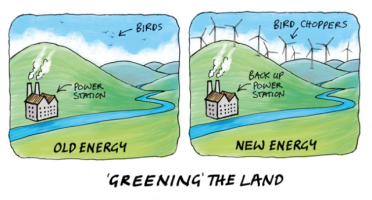willwander
Top Poster
VIP Member
Usually one, sometimes two.Do
Dont EVs have four electric copper filled motors driving the wheels?
Usually one, sometimes two.Do
Dont EVs have four electric copper filled motors driving the wheels?
it doesn't matter. A Tesla still has a 12V system to operate lights , the big screen, powered seats, windows , airbags etc... So there won't be any savings of copper there.Usually one, sometimes two.
it doesn't matter. A Tesla still has a 12V system to operate lights , the big screen, powered seats, windows , airbags etc... So there won't be any savings of copper there.
There will be a lot of copper needed for all the infrastructure , copper we seems not to have enough.
And local production may be a solution for remote locations, provided we are happy to convert fields previously used to have "local food" to solar fields and wind turbines everywhere. Nice countrysi

Bird ChoppersView attachment 104790
i think theres a bit of copper in these things too
can't call em birds anymoreBird Choppers
I bet you've chopped a few in your time.
The important metric is demand v generating capacity not wether demand is going up or down. As I understand it demand is something close to 90% of generating capacity. If so, then as energy hungry technologies come on stream, data centers EVs etc, the ability of the generating infrastructure to meet demand becomes increasingly difficult. New wind is fine, but wind is unreliable.No it's not.
The United Kingdom's electricity use has been in decline since peaking at 357 terawatt-hours in 2005. In 2021, the UK's electricity consumption fell to its second-lowest level this century, at 294.4 terawatt-hours.
That is not to say it won't rise again, and we might face local shortages requiring power line upgrades, but there is plenty of wind power coming online over the next few years, perhaps with surplus to export on windy days or to use to make hydrogen from the seawater around the windfarms.
Thats criminal. Eileen is still looking for a roastingcan't call em birds anymore
More and more connected devices means more and more server farms. Data centres consume huge amounts of electricity, not just the servers but also the associated cooling systems. They normally have cold air coming in below the racks and hot air exiting at the top which is then cooled using giant chillers to be circulated again.Is transport electrification really sustainable? Panorama tonight highlighted the strain that Cloud data centres are placing on the electrical infrastructure in the UK and Ireland. How data centre power demand is preventing the building of housing etc. As the EV revolution picks up the power demand will only increase. As someone in the press asked recently: Is the EV requirement one of, or the biggest, con on record?
Another contribution if you've time to watch
I thought he made some valid points. Liked his quote about “(middle class) morals being something that not everyone can afford”.So many flaws in that rant, I don’t know where to start.
I thought he made some valid points. Liked his quote about “(middle class) morals being something that not everyone can afford”.
I thought he made some valid points. Liked his quote about “(middle class) morals being something that not everyone can afford”.
With specs like these "All versions of Ami feature a 6kW electric motor, allowing the new model to reach a top speed of 27.9mph, and a 5.5kWh battery that gives it a range of over 46 miles (under WMTC testing)." the Citroen Ami is a niche product aimed at an urban environment where public transport infrastructure (buses, trams, tube, taxis, cycle routes) is by and large widely available. Hardly a game changer for the non urban or suburban resident.As far as I can tell, the cheapest new road vehicle available to buy now is an EV costing £7,695 OTR and charges to 80% from a standard three pin socket in three hours.
As interesting as the Ami is, it isn’t a realistic alternative to a “proper car” for non city dwellers. I think you are talking £25k plus to get a EV that comes anywhere near being a practical alternative.With specs like these "All versions of Ami feature a 6kW electric motor, allowing the new model to reach a top speed of 27.9mph, and a 5.5kWh battery that gives it a range of over 46 miles (under WMTC testing)." the Citroen Ami is a niche product aimed at an urban environment where public transport infrastructure (buses, trams, tube, taxis, cycle routes) is by and large widely available. Hardly a game changer for the non urban or suburban resident.
With specs like these "All versions of Ami feature a 6kW electric motor, allowing the new model to reach a top speed of 27.9mph, and a 5.5kWh battery that gives it a range of over 46 miles (under WMTC testing)." the Citroen Ami is a niche product aimed at an urban environment where public transport infrastructure (buses, trams, tube, taxis, cycle routes) is by and large widely available. Hardly a game changer for the non urban or suburban resident.
Yes, and with these policies they will never ever be able to change that disadvantage, whereas in the past they could afford a £500 starter car and begin to change their situation and enjoy some of the freedoms we do.But let us also not forget the millions, including many of the poorest, households who have no car and will be mostly unaffected by the rising costs of car ownership.
So many flaws in that rant, I don’t know where to start.
I'm struggling to think of anyone it will suit.Yes, it won’t suit everyone, we know that. But it is more affordable than many (all other) city cars, and an EV. A solution to the rising costs of motoring for some. Other solutions will appear.
Yes, and with these policies they will never ever be able to change that disadvantage, whereas in the past they could afford a £500 starter car and begin to change their situation and enjoy some of the freedoms we do.
I'm struggling to think of anyone it will suit.
Limited range, no luggage space.
2 seats.
Need off road parking so it can be charged
Too slow to go out of town.
Sounds more like a second or 3rd car for a well off family rather than as family transport for a couple struggling to make ends meet.
Saying it's more affordable than many, doesn't actually make it affordable, an £8k car is a dream to many people.
If it's only a city car surely the answer is to make public transport better so it is not needed.
The cost of buying that would cover a lot of uber fares.
It looks far more practical as a hire car - an alternative to renting a scooter on a rainy day.
I aspired to a rusty orange Capri when I was youngerI have no doubt that the equivalent of a rusty orange Ford Capri will appear in the form of clapped out EV with limited range.
Good thing the UK isn't the US. I can just imagine the lawsuits as cords are daisy chained across open spaces for luckless pedestrians to trip over, as desperate EV owners try to add a few kW to their depleted batteries.a nearby lamp post charging point. They hire a car for bi-monthly out of town excursions.

As did I. With a hydrofoil on the back.I aspired to a rusty orange Capri when I was younger

The VW California Club is the worlds largest resource for all owners and enthusiasts of VW California campervans.

